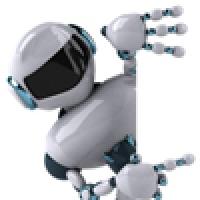
Humans, machines, and the future of work
This article is based on a talk given by Vardi at the Ada Lovelace Symposium, which took place at the University of Oxford in December 2015. You can watch the full talk here!
In March this year the Go champion Lee Sedol lost to the computer AlphaGo. Sedol is the highest-ranking Go player so far to be defeated by artificial intelligence, and the win counts as a significant advance in AI.
But will the rise of intelligent machines benefit humankind in the long run, or is it more likely to do harm? In this article we'll explore this question — not by focussing on deep philosophical questions, but by looking at the world of work and hard economic data.
The great decoupling
The world is just coming out of the deepest recession since the great depression in the 1930s. Out of all the recessions after WWII, the current one saw the most dramatic job losses.

Chart from calculatedrisk.com.
To understand the long-term future of jobs, let's look at what economists call the great coupling. What drives economic growth overall is economic productivity. Since 1953 labour productivity in the US has consistently increased (see the chart below), producing benefits for everyone: GDP grew and with that growth jobs were created and incomes increased. These four indicators — GDP, labour productivity, income and employment — increased in harmony for such a long period of time that people have come to believe their coupling to be an economic law.
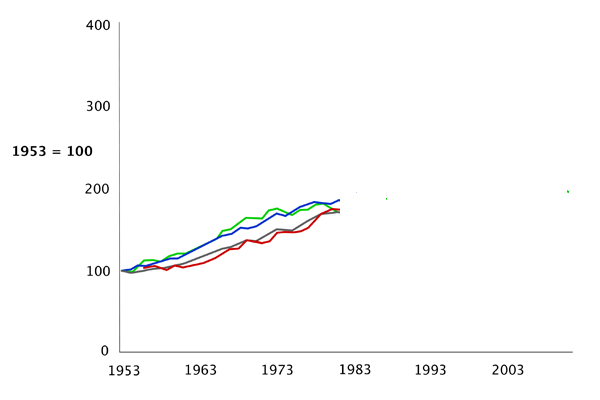
US productivity (blue), GDP (grey), employment (red) and income (green) from 1953 to 1983. Figure reproduced from a chart on Andrew Mc Afee's blog.
But it turns out this isn't the case. Since the 1980s we have seen a great decoupling. As the chart below shows, it's possible for productivity and GDP to grow without the benefits spreading uniformly. Private employment and median household income have flattened. Economists used to believe that the rising tides lifts all boats, but now it seems that the tides and the boats have parted company (to quote the US journalist Harold Meyerson).
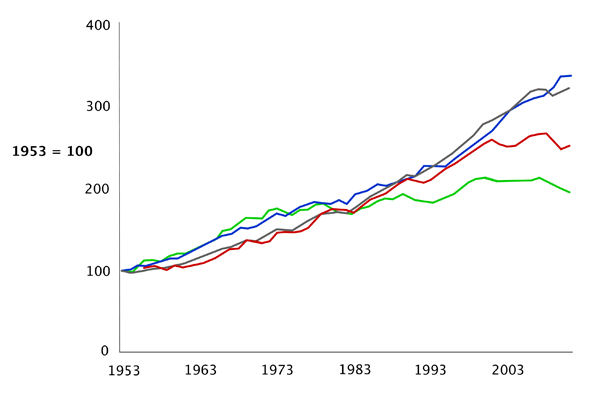
US productivity (blue), GDP (grey), employment (red) and income (green) from 1953 to 2011. Figure reproduced from a chart on Andrew Mc Afee's blog.
What is causing this?
A group of people who call themselves the neo-Luddites blame technology. Machines have become so smart, they argue, they no longer need unskilled labour to operate. Machines are taking away our jobs.
On the other side there are neoclassical economists, who disagree. "Since the dawn of the industrial age, a recurrent fear has been that technological change will spawn mass unemployment," writes economist (and chess Grandmaster) Kenneth Rogoff. "Neoclassical economists predicted that this would not happen, because people would find other jobs, albeit possibly after a long period of adjustment. By and large, that prediction has proven to be true."
Who is right? To find out, let's go back to basics.
The robots are coming
In 1950 the famous computing pioneer Alan Turing gave a compelling philosophical analysis for the feasibility of intelligence machines. "I believe that at the end of the century the use of words and general educated opinion will have altered so much that one will be able to speak of machines thinking without expecting to be contradicted," he wrote.
The military robot BigDog.
Over 65 years later we still haven't fully cracked the problem of artificial intelligence. But from the 1990s onwards there have been a number of breakthroughs. In 1997 IBM's computer Deep Blue beat the reigning chess world champion Garry Kasparov, regarded by many as the best chess player of all time. In 2005 and 2007, as part of the DARPA Grand Challenge, autonomous vehicles successfully negotiated unrehearsed desert trails and urban environments, respectively, avoiding hazards and obeying rules, just as humans would. In 2011 IBM's computer Watson defeated the two greatest Jeopardy! Champions. The video on the right shows the military robot BigDog mastering tricky territory, even righting itself when kicked. And of course there is the recent development in Go. In both brainpower and physical dexterity, robots are on the rise.
More generally, it's hard to argue that intelligent machines are impossible — after all, we ourselves are intelligent biological machines. The universities of Oxford and Cambridge seem to be worried about this: both study the potential danger of AI (at the Future of Humanity Institute and the Centre for the Study of Existential Risk, respectively). And people including Stephen Hawking and Bill Gates have recently deemed artificial intelligence an existential risk for humanity. But our focus here is on jobs.
Are they taking our jobs?
Robots are indeed taking over human jobs, from deboning chicken to performing pharmacy duties, and from tending bars to guarding prisons. A quick internet search will reveal hundreds of recent news stories covering robots performing routine tasks hitherto done by humans.
So let's look at some hard economic data. The chart below shows US manufacturing output (in blue) from 1950 to 2010, compared to manufacturing employment (in red). The general trend for output has been going up, but employment has gone down since around 1980.
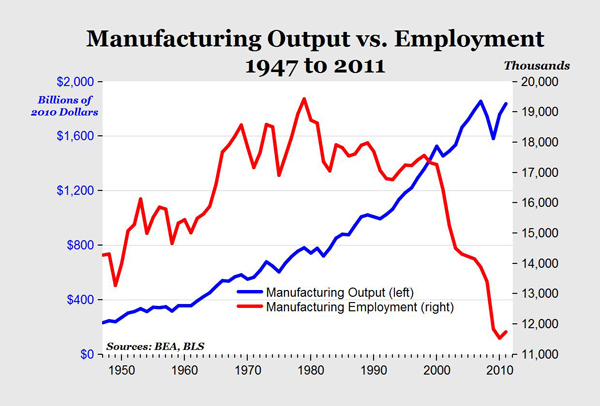
Chart by Mark Perry, Carpe Diem blog.
This isn't because all the jobs have gone to countries like China: Chinese data shows a similar decline in manufacturing jobs, albeit a more recent one.

Manufacturing employment and output in China, 1990 - 2008. Figure reproduced from chart shown on Digital Community.
Another hot political topic is inequality. The charts below show that only the top 10% have made gains over recent decades, be it in average income or in share of income.
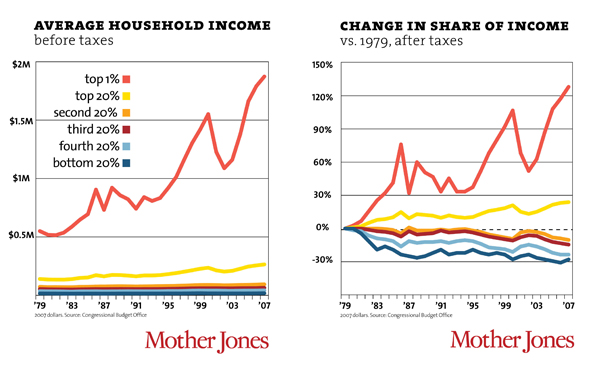
Charts originally printed in Mother Jones, September/October 2011.
Something similar holds when you zoom in on the top 10% earners. The bottom 90% of those top 10% just flatline, and it's only really the top 0.01% that have profited. Even in this exclusive income bracket, the bottom 90% can complain about the top 1% of the top 1% doing better than them!
The next chart shows who has benefited from periods of economic expansion: in earlier years most benefits went to the bottom 90%, but now they go to the top 10%.
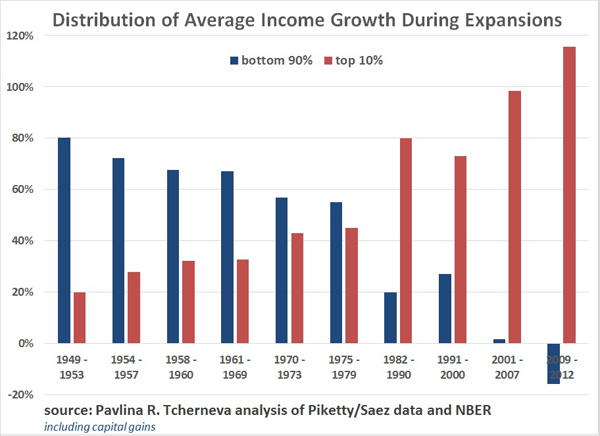
Tcherneva, Pavlina R. Reorienting Fiscal Policy: A Bottom-up Approach, Journal of Post Keynesian Economics, Fall 2014, 37 (1): 43-66. See here for a brief note on inequality by Tcherneva and here for a longer one.
You might say, well this is class war. Why should you care about the rich getting richer? But it turns out that inequality is tied to all sorts of problems in society. It goes hand in hand with a lack of social mobility and also leads to a slow in economic growth, as shown by the following two charts:
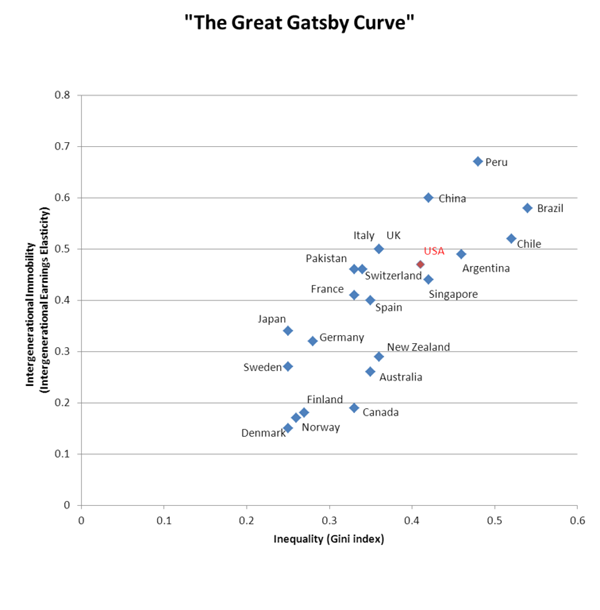
This graph is named after the famous novel by Scott Fitzgerald. The horizontal axis measures income inequality and the vertical axis measures social immobility (the likelihood that someone will inherit their parents' income level). You can see that higher inequality correlates to higher immobility. You can find out more about the Gatsby curve here. Image: BoogaLouie, CC BY-SA 3.0.
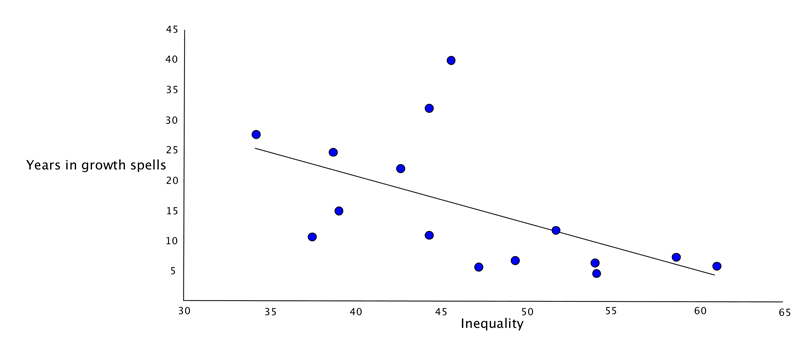
The chart shows that higher inequality correlates to shorter growth spells. Figure reproduced from a chart in the IMF Discussion Note by Andrew G. Berg and Jonathan D. Ostry.
There are also other economic indicators that tell us that something went wrong in the economy in the last thirty years.
Will it be different this time?
It's been suggested that these phenomena are due to technology. But since the beginning of the industrial revolution technological change has not only destroyed jobs — it's also created them. Why should it be any different this time around?

The job market for horses has collapsed drastically in the last 100 years due to technological advances. At least there's niche employment for some of them.
What is different is that we are now working to build machines that will be able to outcompete us in almost everything! Right now artificial intelligence is still a challenge: we cannot yet emulate the physical dexterity or situational awareness of people or even animals. Neither can machines achieve the high-level cognition that is required in many jobs. But there are many jobs that don't require such high-level physical dexterity or cognition. That's why more and more jobs are being automated.
There is some evidence suggesting that things will indeed be different this time. A recent study has found that in 2010 only 0.5% of the US labour force was employed in industries that did not exist in 2000. Compared to major corporations of the early computer revolution, the companies leading the digital revolution have created few employment opportunities. Facebook, for example, has under 13,000 employees. New technologies are not creating the jobs we need them to create to keep the economy humming.
As an analogy, imagine a conversation between two horses somewhere around the beginning of the 20th century. One horse, having seen driverless carriages and early cars, is worried about the future of horse jobs. The other believes the new advances will create new jobs. As it turns out, 1915 was the year of peak employment for horses. Today most horses in the Western world exist as pets. Horses have found a niche employment, but their numbers have decreased drastically.
The future
What does all of this mean for our future?
The most common answer is that a future with intelligent machines is a wonderful thing: we won't have to work and can instead engage in meaningful leisure activities. The problem with this is that it requires a huge economic adjustment — and such an adjustment can take a long time. I would argue that societies took at least 200 years to fully adapt to the industrial revolution. It started in the 17th century, but full adaptation only came with the development of the modern social-democratic state with its social-safety network, which didn't appear until after WWII. Economically adapting to the new changes within, say, a few decades is a huge challenge.
Beyond the economic issues there is also a philosophical question: what is the good life? Is a world without work, without meaningful employment, really going to make us happy? Or is it going to make us dissatisfied, restless and even dangerous, as happens on Theodor Herzl's 1904 play Solon in Lydia. In the play the ancient Greek Eukosmos develops a way of making flour without growing wheat, eradicating most people's need for work. The effect on society proves disastrous and Eukosmos eventually drinks a chalice of poisoned wine to make sure he and his dangerous method perish forever.
The industrial revolution took off on the discovery of fossil fuels: a source of energy that doesn't depend on human or animal labour. Fossil fuels liberated us from labour in an unprecedented way. But we're now paying the price of climate change. Getting off the fossil fuel train is proving incredibly hard. Maybe this is the time to think before it happens, not after. To quote Nigel Cameron, leader of the Center for Policy on Emerging Technologies (C-PET), "Will a world without work be heaven or hell? Now is the time to think it through."
About this article
Moshe Y. Vardi is a professor of computer science at Rice University. His research focus is on artificial intelligence, as well as its impact on labour.
This article was adapted from a talk given by Vardi at the Ada Lovelace Symposium, which took place at the University of Oxford in December 2015.
Comments
Anonymous
Let's talk about not having to work and yet somehow still miraculously managing to stay alive only once a "down-scaled" worker starts cashing in the proceeds of the work of the machine that replaced him, instead of all of it going to, say, the already filthy-rich owner of the factory, who may or may not actually spend some of it further enriching the owner (but not the workers, if there are any left) of some other factory in the process. As it is, the worker is just forced to find work (in some niche his entire life's experience is completely orthogonal with) yet again in a more and more crowded market less and less able to support yet another redundant "services" job people have less and less extra income to spend on.
Anonymous
very interesting article!
Anonymous
'Will a work without work be heaven or hell?'
Marianne
Thanks for spotting that typo, we've corrected it.
Anonymous
Man seeks to satisfy his desires with the least exertion, yet his desires are unlimited.
This implies optimistically that as more and more menial jobs are tackled by machines and robots, we will have a chance to make life better for ourselves, whether it is by altruistic activities in helping less fortunate people than ourselves, or simply becoming more intellectual ourselves, and that this process will never fail to absorb our energies.
There is another side to it and that is the pessimistic implication of the two axioms, that we are both lazy and greedy! So if indeed this is the true situation, our job on earth is done and we will return to a Garden of Eden style of existence, without the need for having many people around and without the need for the enjoyment of having deep knowledge.
Anonymous
People aren't naturally lazy. Just the opposite. However, creativity and perceived meaning play very important roles in the work we want to do. We work either out of necessity (survival, for example, which is/should be getting more and more unnecessary) or to keep active (whether physically or mentally). People are planners, creators, and doers. If something is no longer necessary for us to work on, then let the machines do it. This will free us to work on the things we actually really enjoy, provided that the systems we have in place follow suit. As it stands, people are still working long hours when technology has advanced way beyond that. The system as a whole is still stuck in the "old way" of doing things.
Anonymous
would love more detail on the phenomena influencing the data that are presented here: e.g., effects of the historical decrease in trade unions affecting salaries and employment rates; the increase in internationalization affecting competition; data on the pervasiveness of robots in jobs and industries, beyond examples about the presence of them; more on the jobs that the top 1% have -- and finally, whether computer science professors can be replaced by robots that can explain how robots are taking over - seriously, a thought provoking and nice talk!
Anonymous
I have given this a lot of thought over the years especially given my career in the computer industry. My question is, "What will things cost in this future?". If machines are making all the things and machines are making the machines that make all the things, why would anything that is made by machines cost anything? As I understand economics, things cost because there is human labor involved in it, or a human owns something that is used to make the things and those human demand rent. So things cost money because of human labor or rent seeking capital owned by humans. If machines do all labor you are left with only capital. This likely explains why there is more and more inequality. The rich own the capital and get rent. Labor is slowly disappearing. But other than land and housing (capital) it seems that many things are costing less and less or if they cost more they last much longer which means the cost to own is less. I own three vehicles: an 14 year old truck (owned by me for 11 years), a 15 year old car (owned by me for 13 years), and a 16 year old car (owned for 16 years) with no plans to replace as yet.
Anonymous
The only thing certain.........pundit predictions will be proven wrong....as they always have.
Anonymous
Great article. I've been pondering these eventualities for decades.
Anonymous
Data in the linked paper shows there is not a gap between productivity and compensation.
http://www.heritage.org/research/reports/2013/07/productivity-and-compe…